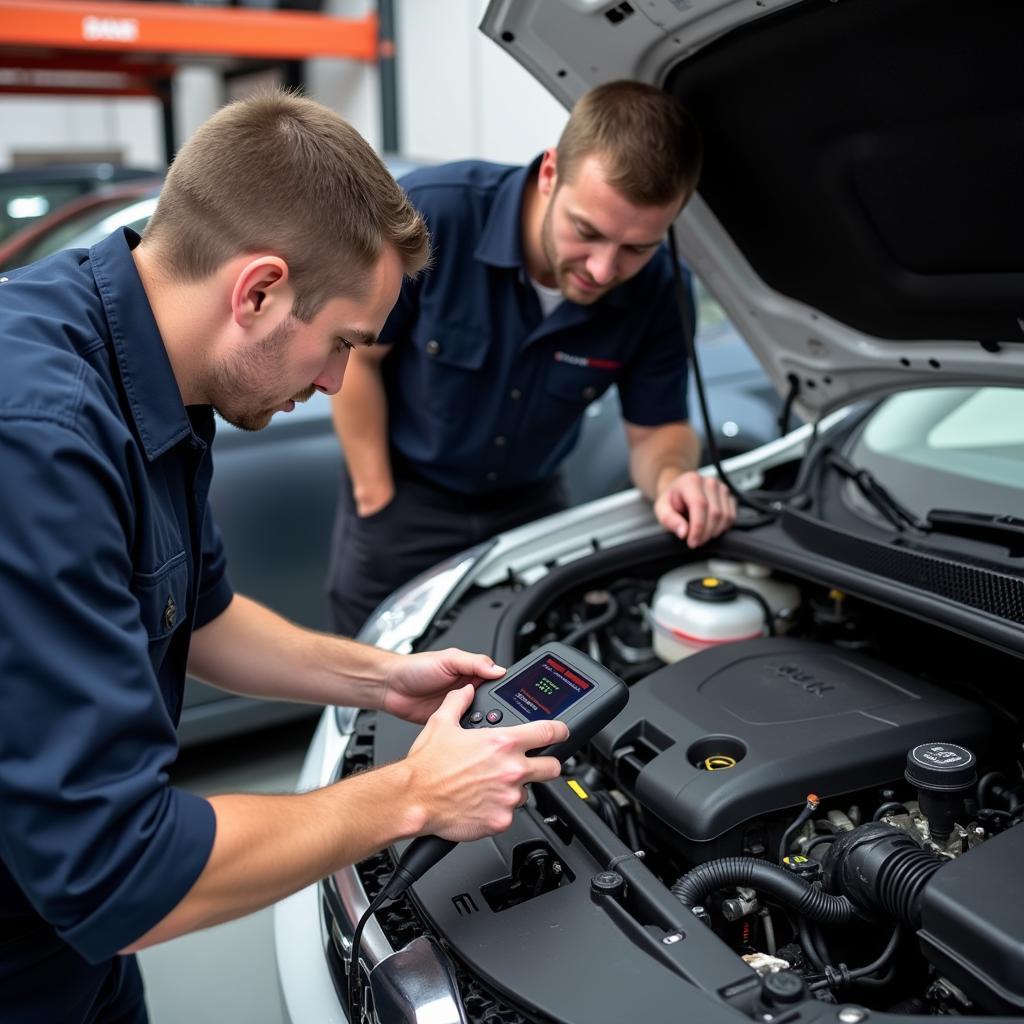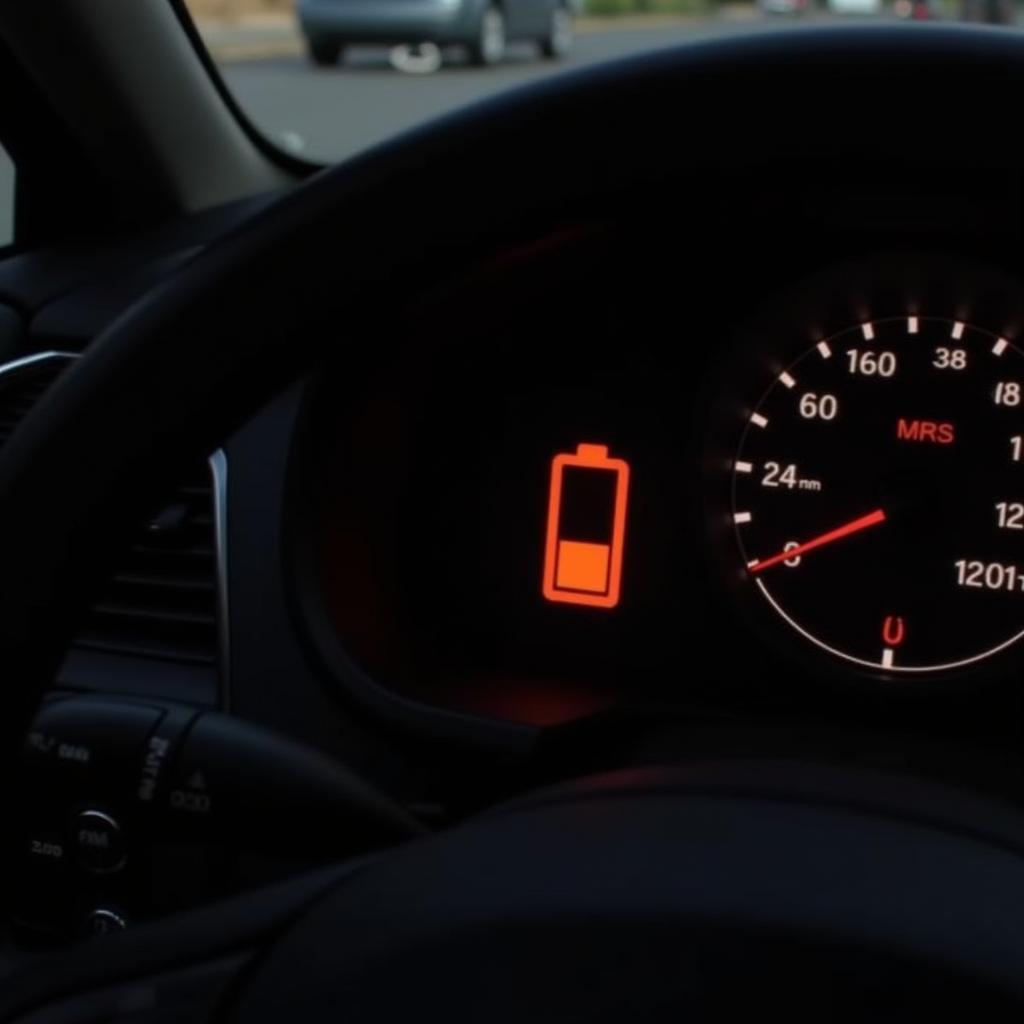A clicking noise and a car that won’t start is a frustrating situation. This article provides a comprehensive guide to diagnose and troubleshoot the problem, helping you get back on the road quickly. We’ll explore common causes, from a simple dead battery to more complex starter issues, and offer solutions you can try yourself, or with the help of remote diagnostic services.
Why is My Car Making a Clicking Noise and Not Starting?
Several issues can lead to a clicking noise when your car refuses to start. Identifying the source of the click is the first step towards a solution. Is it a rapid clicking, a slow click, or a single loud clunk? Each sound points to a different potential culprit.
The Dreaded Dead Battery: Most Common Culprit
The most frequent cause of a clicking noise car won’t start scenario is a dead or dying battery. The clicking sound you hear is the starter solenoid engaging, but the battery lacks the power to crank the engine. This is often accompanied by dim headlights and interior lights.
- Jump-starting: The quickest way to check if your battery is the issue is to jump-start your car. If it starts, you’ve identified the problem.
- Battery Testing: Have your battery tested at an auto parts store or by a mechanic. This will determine its charge level and overall health.
- Battery Replacement: If the battery is faulty, it needs replacing. Modern cars often require specific battery types, so consult your owner’s manual or a professional.
Starter Motor Problems: Beyond the Battery
If jump-starting doesn’t work, the problem might lie within the starter motor itself. The starter is responsible for cranking the engine, and a failing starter can produce a clicking noise, especially a single loud clunk.
- Starter Solenoid: The solenoid is a crucial component of the starter. A faulty solenoid can prevent the starter from engaging properly, resulting in a clicking noise.
- Starter Motor Failure: The starter motor itself can wear out over time. Internal damage can lead to clicking noises and prevent the engine from turning over.
- Remote Diagnostics: Remote diagnostic services can pinpoint starter issues without physical inspection, saving you time and potentially money.
Electrical System Issues: A Deeper Dive
Sometimes, the clicking noise and starting failure are symptoms of a broader electrical problem. These issues can be more complex to diagnose and may require professional assistance.
- Corrosion and Loose Connections: Corroded battery terminals or loose connections within the electrical system can disrupt the flow of power to the starter.
- Faulty Alternator: A failing alternator can prevent the battery from charging properly, leading to a dead battery and the associated clicking.
- Wiring Problems: Damaged or frayed wiring can also prevent the starter from receiving sufficient power.
- Remote Software Installation: In some cases, remote software installations can resolve electrical issues related to the car’s starting system.
What to Do When You Hear a Clicking Noise and Your Car Won’t Start
- Check the Battery: Attempt to jump-start the car. If this works, have your battery tested and replaced if necessary.
- Listen to the Clicking Noise: A rapid clicking often indicates a dead battery, while a single loud clunk may suggest a starter problem.
- Inspect Battery Terminals and Connections: Look for corrosion or loose connections and clean or tighten them as needed.
- Consider Remote Diagnostics: Remote diagnostic services can provide a more in-depth analysis of the problem, especially for electrical issues.
- Seek Professional Help: If you are unable to diagnose or fix the issue yourself, consult a qualified mechanic.
 Mechanic Diagnosing Car Starting Problem
Mechanic Diagnosing Car Starting Problem
Conclusion: Getting Your Car Started Again
A clicking noise and a car that won’t start can be a significant inconvenience. By understanding the common causes and following the steps outlined in this guide, you can quickly diagnose and troubleshoot the problem. Whether it’s a simple battery replacement or a more complex starter issue, addressing the problem promptly will get you back on the road. Remember, remote diagnostic services and professional mechanics can provide valuable assistance when needed. Don’t let a clicking noise stop you!
FAQ: Clicking Noise Car Won’t Start
-
Q: Can a bad alternator cause a clicking noise? A: Yes, a failing alternator can lead to a dead battery, causing a clicking noise when trying to start.
-
Q: What does a rapid clicking noise mean? A: A rapid clicking usually signifies a low or dead battery.
-
Q: What does a single loud clunk mean? A: A single loud clunk often points to a problem with the starter motor or solenoid.
-
Q: Can I fix a starter problem myself? A: While some basic checks are possible, starter repairs often require specialized tools and expertise.
-
Q: How much does a new starter cost? A: Starter motor replacement costs vary depending on the make and model of your car.
-
Q: How can remote diagnostics help? A: Remote diagnostics can identify the underlying cause of the clicking noise and starting problem without physical inspection.
-
Q: How often should I replace my car battery? A: Car batteries typically last 3-5 years, but various factors can influence their lifespan.


